Preliminary injunction bars Galaxy Nexus, but Apple is a loser for winning
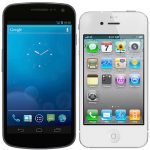
Apple's ridiculous patent assault against Samsung finally hits Google, which suddenly looks genius for choosing Asus to manufacture the Nexus 7 tablet. On Friday, US District Judge Lucy Koh issued a preliminary injunction against Galaxy Nexus, which is Google's flagship, stock Android smartphone. Days earlier she barred Galaxy Tab 10.1. For the preliminary injunction to go into effect, Apple must first put up $96 million.
What timing. To preview Android 4.1 Jellybean, the company gave one to each of more than 5,000 developers during Google I/O earlier this week. The new OS releases to Motorola XOOM tablets and Galaxy Nexus in mid-July, making the smartphone the first to get the important upgrade. The preliminary injunction would somewhat stymie Jellybean distribution ahead of iO6, which Apple is months from releasing. New features include voice response, that in BetaNews testing smoke Apple's Siri. If you're thinking about buying Galaxy Nexus, don't wait!
Would you sell your iPad and buy Google Nexus 7?
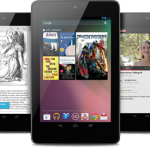
I ask because this morning I got email from a reader who is doing just that. "I ordered my Nexus 7 yesterday for $249, and I am selling my iPad gen 1 for $200", Brian Fagioli writes. It's not a bad trade-off. The original iPad is obsolete when iOS 6 ships, while Nexus 7 packs the newest Android version, Jelly Bean. But would you, and even for a newer iPad?
Google announced the tablet yesterday at Google I/O. Two models are available for preorder -- 8GB ($199) and 16GB ($249) -- and ship in mid-July. I wouldn't call Nexus 7 an iPad-killer, since it's a product with different ambitions: Reclaiming the Android tablet ecosystem from Kindle Fire. But the lower price and smaller size, and Android 4.1, do appeal. The question is to whom.
Android users are smarter than you

Just ahead of Google I/O 2012, The Street claims that "Android users don't know enough to matter". Interesting story, especially considering the timing, and one that’s bound to stir lots of criticism just because it puts down all Android fans in the world.
There are plenty of references, but they sustain a flawed point of view.
Would you believe Android tablet adoption is even with iPad?
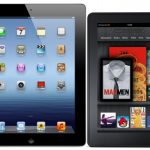
I surely don't. Perhaps even I am too influenced by all the pro-Apple propaganda. But the figures come from a reasonably reliable source, Online Publishers Association, which puts US iPad adoption at 52 percent and Android at 51 percent. Okay, I'll pause so you can wipe off coffee, or whatever else just spit out, from your computer screen.
The numbers don't add up to 100 percent, because some people own more than one type of tablet. Android gains largely come from Kindle Fire, which share is 32 percent -- four times new iPad and one point more than the original. Year over year, overall Android penetration rose from 32 percent, while iPad's fell from 72 percent. Perhaps it's no coincidence Android rose by 19 points and iPad fell by 20.
Apple dumps Google Maps
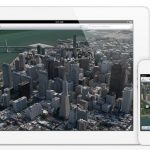
The marriage is over. As widely rumored, Apple debuted its own mapping service alongside the unveiling of iOS 6 at the Worldwide Developers Conference Monday. The move had been expected for awhile now, considering the Cupertino, Calif. company's recent acquisitions.
Apple's Maps include turn-by-turn navigation with smooth vector-based graphics. "Flyover mode" is the company's answer to Google Earth and Street View: it includes photo-realistic views of major cities, even allowing you to fly around and see all sides of a particular building. Traffic including crowd-sourced reports are built in, which can be used to change directions on the fly.
Today Apple and Microsoft write Android's epitaph

As I compose this post, Microsoft's TechEd keynote is underway, while Apple will kick off Worldwide Developer Conference in just a few hours. Both events will put forth very different views of the cloud-connected device future, which Gartner says will start as soon as 2014, when the cloud replaces the PC as everyone's personal digital hub.
For Apple, iOS 6 will be center stage, whetting consumers' appetites and giving them another weapon in their bring-your-own-device assault on workplace IT. Meanwhile, Microsoft pitches new wares for the enterprise -- Office, Windows 8, RT and Server, for starters. Where the two companies meet is the tablet, and there's no room between them for Android.
Google activates 900,000 Androids per day

Andy Rubin revealed the number late day, on the eve of Apple's developer conference. Google's Android chief disclosed the activations while dispelling rumors circulated by Robert Scoble about leaving for startup CloudCar. Rubin isn't going anywhere.
He last disclosed activations per day -- 850,000 -- on February 27. The new number means 27 million a month or 81 million every 90 days. That number is consistent with actual smartphone sales. Gartner, which tracks sales to end users rather than the analyst firm standard of shipments into the channel, reports 81.067 million Androids sold during first quarter -- again, that's smartphones and doesn't include tablets. By comparison, Apple sold 33.1 million iPhones, but the number doesn't include iPad or iPod touch.
Techies, June will be the most amazing month EVER

Save your greenbacks now. During these thirty days you'll hear about lots of innovative and imitative products coming for the holidays. There's no coal in Santa's stocking this year, just too much tech to fit your gift list.
Not since the late 1990s, when seemingly every day some vendor announced a new PC that was ever-so-better than the one you bought the week before, is there so much new tech coming so close together. The cloud connected-device era ushers in a storm of tech. Save up now so you don't break the bank account or exceed credit card limits later.
Siri sucks
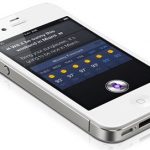
Yesterday, during the annual D conference, Apple CEO Tim Cook said that the company is "doubling down" on Siri. Improvements are coming -- promised without admission of problems, although complaints about them are many. Then there's the lawsuit claiming Siri fails to meet advertised capabilities. You could interpret Cook's promise as concession Siri sucks or that Apple is preparing to take on Google in search. I see it both ways.
Five years ago, Apple supercharged the smartphone category with a more natural user interface. Suddenly, there was a new way to interact with a mobile phone that was seemingly magical. Humanness made the original iPhone stand apart from all competitors, and Apple used a variety of sensors to imbue the quality. Touch, and its intimacy, and the way the handset responded to your proximity gave it the human quality. But Apple has done little since, other than Siri, which does add a little more humanness to iPhone 4S. She adds personality and extends the mobile user interface to another more important than touch: Voice. Problem: There's something inhuman about Siri's often frustrating responses to questions.
What would you pay for a 7-inch, quad-core Asus-made, Googe-branded Android 4.1 Nexus tablet?
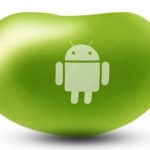
Rumor stories are uncommon here at BetaNews, and rare when we don't get the information ourselves. But Android Police has got one so tasty and so in line with others, I can't resist. In less than one month, Google could debut the highly-anticipated Nexus tablet, produced in conjunction with Asus and packing quad-core Tegra 3 processor and Android 4.1. The only question, if rumors prove to be true, is price. What would you pay for a 7-inch Asus-made, Googe-branded Nexus tablet?
David Ruddock reports evidence from Rightware's Power Board benchmark and Android Police server logs showing instances of Androd 4.1 and Nexus devices. But the benchmark tool is more revealing: 1.3GHz nVidia Tegra 3 quad-core processor, 1280 x 768 resolution display, Google brand and product name Google Asus Nexus 7. That's hardly a smoking gun. Asus and Google could be testing a prototype device, or even several. But given that Google I/O starts June 27, developers received tablets there last year and the search giant promised a Nexus tablet in about six months half a year ago, the discovery is too credible to ignore.
Google+ for Android catches up with iPhone
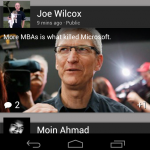
Well, perhaps I should qualify that with "almost", depending on what matters more to you as a user. On Thursday, 15 days after releasing a major Google+ update for iPhone, the Android version arrived. Timing is interesting. According to NPD, considerably more Android users access Google+ from the browser than the app -- 16 percent to 10 percent overall reach, in March, respectively. My question for you quick downloaders, will that be true for you, or is the app now preferred? It's no idle question, because the web experience is now so vastly different from the app.
Like its counterpart, Google+ for Android offers bleeding-edge photos. Pretty much everything about Google+ bleeds the edge of the screen. The effect is immersive. You just want to scroll and scroll -- and you will since so much less content fills the screen now. But the Android version has better visual flow than its iOS counterpart. Stated differently: It's snappier, more alive. "We're building for a mobile future", Google senior veep Vic Gundotra says. That's apparent from just how different the app is from the web experience -- and how immersive.
HTC says some of its blocked phones have passed customs
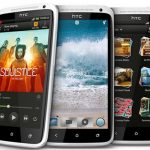
Last week, the news broke that some of HTC's new Android smartphones, including the One X and EVO 4G LTE were being held up in U.S. Customs for potentially violating an ITC exclusion order.
HTC last Wednesday confirmed that these two phones were delayed due to "a standard U.S. Customs review of shipments" that was required as a result of the ITC order. The company said "We believe we are in compliance with the ruling and HTC is working closely with Customs to secure approval." The customs delay caused the launch of the EVO 4G LTE to be postponed.
Smartphone market consolidates around Apple and Samsung

Today, Gartner put to end weeks of cellular handset debate. Apple apologists disputed Samsung's smartphone success over iPhone -- the presumption that the South Korean electronics giant benefits from greater shipments vs actual sales. Make no mistake: Samsung is the global leader overall and in the smartphone category, based on actual sales. Apologist arguments be damned.
That said, Apple's position is solid. Together, Apple and Samsung combined smartphone sales market share approaches 50 percent. Contrary to speculation that Windows Phone might appear as a third dominant mobile OS, the market is set to largely split between two vendors. As I explained three weeks ago in post, "Google has lost control of Android", Sasmung's rise isn't necessarily good for the broader ecosystem.
Apple patents block HTC One X and EVO 4G LTE from U.S. market
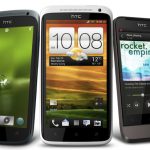
"The US availability of the HTC One X and HTC EVO 4G LTE has been delayed due to a standard U.S. Customs review of shipments that is required after an ITC exclusion order," a boilerplate statement from Taiwanese smartphone maker HTC said on Wednesday.
The company's flagship smartphones are being held up in customs as a result of patent litigation with Apple, and their availability to consumers is currently on hold. Though it only launched on May 6, AT&T currently lists the One X as "sold out," and Sprint's EVO 4G LTE which was slated to launch on Friday, May 18, will be delayed. Pre-orders of the device do not have a guaranteed ship date.
You can have iPhone 4S, I'll take Galaxy Nexus

During the last six months, I've had the privilege to use three exceptional smartphones: iPhone 4S and two Galaxy Nexus variants -- one LTE and the other HSPA+. You can't go wrong buying either Android or iOS handset, although Galaxy Nexus supports more carrier networks here in the United States. Differences that matter are more than hardware (such as size, appearance or battery life) or software (apps and operating systems). Taking Galaxy Nexus or iPhone 4S is much more. Either is a digital lifestyle choice that many buyers won't grok before paying their hard-earned cash.
I can't emphasize this aspect strongly enough. In the days before Android and iPhone, early smartphone buyers also made digital lifestyle choices, such as BlackBerry users and persistent email or Windows Mobile buyers wanting mobile Office. But today, with differentiated, connected cloud services, digital lifestyle matters more than ever, and both handsets offer similar yet drastically different experiences. You're not just buying a phone but a way of life.
Recent Headlines
Most Commented Stories
BetaNews, your source for breaking tech news, reviews, and in-depth reporting since 1998.
Regional iGaming Content
© 1998-2025 BetaNews, Inc. All Rights Reserved. About Us - Privacy Policy - Cookie Policy - Sitemap.